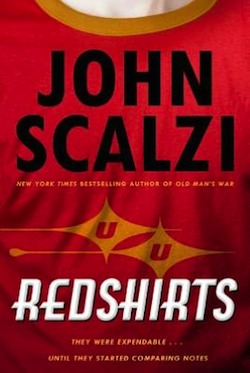 Ensigns Dahl, Duvall, Hester, Finn, and Hanson are ensigns that have been assigned to the Intrepid, the flagship of the Universal Union's spacefleet. They soon discover that things are very wrong onboard the ship. The Intrepid has a crew problem - specifically that it always needs more crew. It has a disturbingly high casualty rate for away missions - particularly missions involving specific key members of the crew. Because of this, the rest of the crew has developed a set of superstitious rules to keep themselves alive. The rules are ludicrous and in some cases are based on a subversion of the laws of science itself, but such complaints ignore the most important part: the rules actually work. Redshirts, the comedy scifi novel by John Scalzi is a parody, a criticism, and at times a celebration of Star Trek and bad scifi writing. More than simply hanging a lantern on all the flaws, inconsistencies, and lazy writing of the average scifi episode, Redshirts makes this the central concept of the story. Though the story starts with this unconventional setup, it doesn't rest there and try to dribble out a basic plot that goes no farther than this first idea. Finding out that there seem to be rules for survival is just the beginning, as our group of ensigns decides to find why this is happening, the meaning behind it, and just what they can do about it. And that's where Redshirts goes farther than a basic story. It doesn't just stop at a unique and comical setup - it heads down the rabbit hole to where such a proposition would lead the characters. This finds them deep in the land of metafiction and Star Trek tropes, displaced in both space and time from where both their and our expectations. It's a fun ride no matter where it leads. The writing is fun, crisp, and uncluttered. Characters are defined by their conversational exchanges more than a list of descriptions. The book doesn't waste time telling you to empathize with a character, instead the character talks and acts, giving you much better reasons to know and like them. The writing never seems laborious and instead possesses a one-more-chapter quality that will keep you up late into the night. The central theme of Redshirts is repeated in the three part coda included after the end of the novel. It doubles down on the ideas of tropes, clichés, and the scifi we've all seen before It points out not just that such a repetition of old ideas shows up again and again, but also questions why it should be reoccurring. What's gained by trope repetition and lazy writing? Is it standing in the way of truly interesting scifi plots? Or do we all secretly think we're writing for an audience who wants to see the same thing over and over again? To sum up Redshirts, I'm going to go back to an idiom a friend of mine repeated so many years ago. When describing the latest Star Trek movie and also later when talking about other scifi works, he used this phrase: "It had plot holes that you could pilot a starship through." This novel is doing that very thing: Redshirts is piloting a starship right through the plot holes in the genre... at warp speed. John Scalzi's site Get Redshirts on Amazon
0 Comments
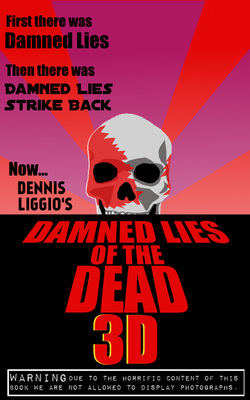 I'm pleased to announce the third book in the Damned Lies series, Damned Lies of the Dead 3D! Centering on the covered up zombie outbreak in Austin, Texas of 1995, this book has more zombies than you can shake a stick at. Meanwhile, at the end of the last book, things weren't going well for a certain someone - can he get himself out of this mess too? These stories and more in the third Damned Lies book, all with the snarky narration you've come to love! Coming soon as an Amazon Ebook!  1975. Things are not going well in the border town of Pinto in Starr County, Texas. Local man Frank Boles has been found shot to death in his home. Deputy Roe found a Mexican man in his apartment, untalkative but otherwise cooperative when he was cuffed. The Mexican had a gun he didn't try to use and ten thousand dollars in cash on him. In the dead man's attic was one hundred thousand dollars worth of contraband. It's the job of sheriff JD McKinnon to make sense of it all. Starr County Line by Chris Gilbreath is a gritty crime novella set in 1975. In its way, it is a successful amalgam between the classic Gary Cooper movie High Noon and the works of Cormac McCarthy, particularly No Country for Old Men. It's a book about an old lawman, grown up on traditional values, so tired of the job but unwilling to quit. It's about a culture clash of old values versus the changing world. It's about one good sheriff against an almost insurmountable wave of Seventies-era Mexican drug smuggling. JD McKinnon is an old man. He was a proud soldier who served in WWII, surviving Iwo Jima before coming home to serve as the law. He knows what needs to be done and he does it. Those same values are what get him in trouble. He refuses to let the right thing go when more sensible men would have looked the other way. He gets involved in a fight that's not his, even though he knew things were going that direction. And when everything falls apart, he protects the ones he loves by refusing their help and going it alone. I admit that this isn't my usual reading genre, so I can't give a litany of my favorites that this reminds me of. But despite that all, this was a compelling read. The novel is conveyed in shorter, almost staccato chapters as it follows McKinnon's investigation and goes into his own back story and personal life. There's something that feels very 1970s to the writing style that you'd think it was that time period even if it hadn't been explicitly said. The feeling of a back-then small town on the precarious border definitely comes through in the writing. For someone who reads this sort of novel occasionally, something that practically drips with the suchness of the genre was very comforting and appealing. My only criticism is that it's a novella. I wanted it to go on longer. Before I knew it, it was leading up the climax and then it was over. I could have basked a little longer in the crime of Pinto, Texas and the aching bones of JD McKinnon. That said, I bet most novels and novellas out there would be proud to hear that they should be longer; too many are unfortunately in the should-be-shorter category. If you're looking for a 1970s border town crime novel, you should check out Starr County Line. Author's Website This video really impresses me. Short, to the point, but managing to get deep under your skin.
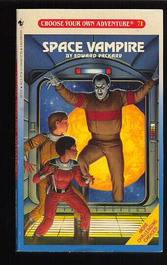 Like many, I grew up with Choose Your Own Adventure novels. I have fond memories of all the different types of adventures. There were scifi and fantasy adventures, as well as books licensed for certain intellectual properties. I gravitated towards the ones that were a D&D or Zork style dungeon crawl, but I admit to remembering I had a fondness for a Gamma World tie in that I can remember only the cover of; that cover was epic to the younger version of me. I'm not sure if the appeal of Choose Your Own Adventures were reader choice and a changing story, or the fact that there was little else that was scifi or fantasy available for that younger reading level. I just knew I read many of them before I was mature enough to read adult scifi and fantasy. It's interesting that all these years later, the thing I remember most from them are the endings. Not even the "true" endings you would get from making all or most of the right choices and seeing the story through to the end. I remember the "bad" endings, the ones you got when you made the wrong choices and the story ended early. These bad endings were at best a page long and often just a few short paragraphs followed by THE END. If you had not been cheating and holding your finger to mark the page where you had just come from, you were left without a page number reference and you'd have to start the whole thing over. 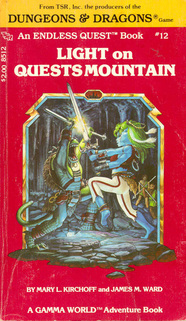 This picture is awesome when you're 8 years old. This picture is awesome when you're 8 years old. What interests me most about some of these bad endings was their ways of changing or subverting the plot. If you successfully completed the Choose Your Own Adventure, you'd get a story about thwarting some evil, often an evil sorcerer, evil presence, evil computer, etc. Basic clichés for a basic story. What interests me now is how some bad endings changed that. You would assume that if you got an ending earlier on, it would keep to the same core narrative, and it would be about how that main plot evil won; you were killed by the sorcerer, minions of the evil computer, the evil presence caught you defenseless, etc. There are some Choose Your Own Adventure books that followed this, but some that didn't. In the ones that didn't follow this, what you got is a complete change from the reality of the main narrative. For example, say you're in a Choose Your Own Adventure where you are entering the castle of the evil sorcerer. In this one you're entering the castle with your trusted ally. Then you choose poorly. What may happen is that your abrupt ending is about getting killed by your trusted companion who is actually evil. But if you follow the main story to a true ending, that companion really is completely trustable, he's not a traitor like in the early ending. In this bad ending, the nature of the story has been changed; a character is completely different than in the approved storyline. In other bad endings you might find things like the sorcerer doesn't exist and it's really a sentient tower that eats people, that the cause of evil is really the feared lizard people who just killed you, or the even more dreaded ending where it was all just a bad dream. 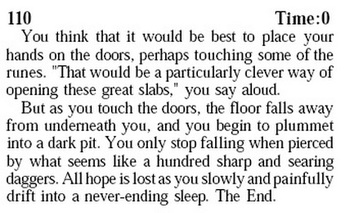 While when I first thought of this as just interesting, it became stranger the longer I thought about it. If you or I thought about writing these, our first thought would be to create a demise for the reader consistent with the true ending, i.e. the narrative of what was "really" going on. We'd make the evil sorcerer have killed you early, rather than thought of a completely different way for you to die that clashes with the main ending. Yet these authors did not do the obvious. Bad endings are a mutation, almost a subversion, of what the book's reality supposedly is according to those true endings. In each of those bad endings, the book's reality was changed to something else. So what is this really, aside from the strangest kid-friendly game of Betrayal At the House On the Hill Ever? It's a fascinating way to play with expectations. It covers up any spoilers for the true endings. It allows the belabored authors a chance to use other ideas, particularly ones that they didn't flesh out well. It also allows them to casually dick over the readers (screw you "it was just a dream" endings!). But it also raised a generation to understand the reality and truth of a story differently than previous generations. If what was going on could change in a Choose Your Own Adventure with just a different selection of pages, did that true ending really happen? Was it anymore likely? What did consistency really mean for a story?  So what does this all mean? Is the fact that Choose Your Own Adventures had this level of interactive reality significant? The problem is that even if it is significant, not every medium can take advantage of it. A non-Choose Your Own Adventure had no reader interactivity. Like a movie, the reader is a passive participant, a mute audience. Their choices are only to continue on or stop reading. No matter how much they will it, no matter the invective they subject the protagonists to, no matter how much rotten fruit is applied to page or kindle, the book will never do anything different. There is but one reality, one story, and that's it. However, there is one modern medium where there is interactivity, and that is video games. Choose Your Own Adventures were popular in an era before video games truly became popular. What video games that did exist did not focus on narrative choice. Their interactivity was limited in scope to a choice that affected moment to moment, never any choices that affected long term, other than a selection of class which meant strategies changed. But choices in games that actually changed the story came later. However, even when video game choice did show up, it was not so malleable as Choose Your Own Adventures. In a video game where player choice affects the ending, it does so in small ways. The narrative reality is consistent - the villain and what he is doing stays consistent no matter the player choice. If they choose something else, his nature does not change. While some of this I know is related to limited production resources, I think another is related to how story narrative is viewed. There is one true story, and video game choices are just mitigating flow to this ending. The choices don't change the nature of the story. Outside a few exceptions that are often bizarre (Hello, Silent Hill Dog Ending), games may have choices, but they don't change the nature of a story's reality like a Choose Your Own Adventure. 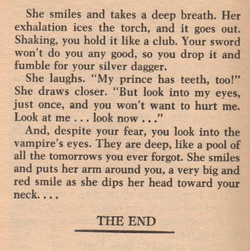 Will we see more of this in the future? It's hard to say. Many video games are overbudget, underfunded, rushed, or might find it completely unfeasible to change things based on player decision. While a murder mystery could have a randomized murderer, I am speaking of a change to things more than just a simple change of identity. Procedurally generated games may have more of an opportunity for this, but do they lose some of the finer points of story writing in the randomized madlibs design? Who knows if games will turn this way? Who knows if any besides me want them to? Back to the literary medium, I have heard that Choose Your Own Adventures made a return a few years ago, but I don't know if they are or will ever be the same as the old ones or if they are cheap cash ins. I find myself loath to go and check them out, so nostalgic as I am for the originals. I think I would rather hunt down some of those original and antiquated gems from my youth then check out the new ones. Innocence lost and found. For all this talk, I'll admit that all I do know is that I still think sometimes of all the different Choose Your Own Adventures I experienced back in the Eighties. And then I think fondly of all the ways I had died in each of them. And that makes me smile. There's an interview with me up on Ginger Nuts of Horror! I talk about some of my favorite authors and answer some questions about writing.
Check it out! |
Archives
December 2022
|
 RSS Feed
RSS Feed
